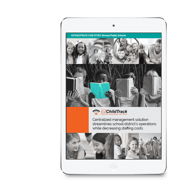.jpg?width=928&height=640&name=Untitled%20design%20(1).jpg)
Childcare management software is transforming how providers and parents manage, communicate, and engage in children’s daily care. By 2025, integrated platforms are leading this evolution, offering an all-in-one solution that simplifies operations, enhances transparency, and strengthens trust. These systems combine essential functions like attendance tracking, health monitoring, communication, and payment processing into a single, seamless interface.
In this blog, we’ll dive into the features parents and providers value most, the benefits of integration, and how these tools are shaping the future of childcare management.
What Are Comprehensive Childcare Systems?
Comprehensive childcare systems unify tools like scheduling, billing, and communication into a centralized hub. Unlike standalone apps or software, these all-encompassing solutions streamline processes, reduce errors, and provide an enhanced user experience for parents and providers alike.
For instance, a provider can track attendance, update health records, and share daily reports with parents—all without switching between platforms. This integrated approach saves time and ensures a smoother workflow.
Why Childcare Providers Are Embracing Unified Solutions
Childcare providers are turning to unified solutions to address common operational challenges. These systems are critical in 2025 because they:
- Reduce Fragmentation: By consolidating tools, providers eliminate inefficiencies caused by juggling multiple apps.
- Boost Parent Engagement: Transparent, real-time communication fosters stronger relationships.
- Enhance Data Security: Centralized systems simplify protecting sensitive information.
By solving these pain points, childcare technology enables providers to focus more on delivering quality care.
What Parents Look For in All-In-One Childcare Software
Parents’ expectations have evolved, and they now demand more from childcare technology. The most valued features in 2025 include:
- Real-Time Updates: Parents want to stay connected throughout the day with notifications about meals, naps, activities, and milestones.
- Simplified Communication: Direct messaging and notification features ensure that parents are always in the loop, reducing miscommunication.
- Health and Safety Tracking: Features like incident reporting and vaccination reminders give parents confidence in their child’s care environment.
- Convenient Billing Options: User-friendly payment portals with automated reminders save parents time and prevent missed payments.
How Centralized Tools Benefit Providers
Providers need childcare tools that go beyond surface-level convenience. Comprehensive systems designed for efficiency and growth offer:
- Centralized Recordkeeping: Maintaining a single source for attendance, health records, and child progress simplifies daily management and regulatory compliance.
- Automated Scheduling Features: From managing staff shifts to coordinating child enrollment, automation prevents errors and saves time.
- Compliance Made Easy: Regulatory tracking tools help providers stay on top of licensing requirements and audits.
- Insights from Reporting Dashboards: Customizable analytics provide a clear picture of attendance trends, financial performance, and child progress.
Benefits of Unified Platforms for Families and Providers
The value of unified systems extends to both sides of childcare:
For Parents:
- Ease of Use: Access everything from updates to billing in one place.
- Trust and Transparency: Real-time insights strengthen confidence in care quality.
- Reassurance: Health and safety tracking gives parents peace of mind.
For Providers:
- Operational Efficiency: Fewer tools mean fewer headaches.
- Improved Parent Relationships: Communication features foster collaboration and trust.
- Enhanced Data Security: Centralized storage ensures better protection for sensitive information.
What’s Shaping Childcare Software in 2025?
As childcare technology evolves, trends emerge that shape its trajectory. In 2025, providers can expect the following advancements in all-in-one systems:
- Eco-Conscious Design: Paperless options for attendance tracking, billing, and documentation are aligning with sustainability goals.
- Mobile-Friendly Interfaces: Platforms optimized for smartphones make it easy for providers and parents to stay connected on the go.
- Customizable Features: Tailored dashboards let users focus on the tools they need most.
- Stronger Security Protocols: Enhanced encryption and multi-layered authentication keep sensitive data secure.
How to Choose the Right Childcare Technology
Selecting a management system that fits your center’s needs is crucial. Here’s what to look for when evaluating options:
Core Features for Providers:
- Centralized access to attendance, billing, and child records.
- Tools for managing staff schedules and compliance.
- Easy-to-generate reports for insights and audits.
Parent-Focused Features:
- Real-time notifications about their child’s day.
- User-friendly communication tools.
- Automated payment portals for convenience.
Security and Scalability:
- Robust data encryption and role-based permissions.
- Flexibility to grow with your childcare center’s needs.
Impact on Child Development
Integrated childcare technology isn’t just about operational efficiency; it also supports child development. Providers can track a child’s learning milestones, tailor activities to individual needs, and share progress updates with parents. Families benefit by gaining deeper insights into their child’s growth, encouraging meaningful engagement at home.
Overcoming Challenges in Adopting New Tools
For providers transitioning to advanced software, challenges like onboarding and adapting to new workflows can arise. However, most platforms offer resources such as training modules, customer support, and guided implementation to ease the process. By 2025, even smaller centers are recognizing these tools as essential for modern childcare management.
Success Stories: Transformations with Unified Software
A kids academy implemented a centralized childcare system in early 2024. Their results included:
- A 35% reduction in administrative time, allowing staff to focus more on teaching.
- A 45% increase in parent satisfaction, thanks to improved communication.
- Streamlined billing processes that eliminated late payments.
This success highlights how adopting a comprehensive solution can revolutionize childcare operations.
The Future of Childcare Management
Unified childcare technology is no longer optional in 2025—it’s a necessity for meeting the demands of tech-savvy families and staying competitive in the industry. By embracing these tools, providers can enhance their operations, strengthen relationships with families, and deliver higher-quality care.
For providers ready to embrace the future of childcare, investing in the right system today can unlock significant benefits tomorrow.
Ready to transform the way you manage your center? Book a demo to see how to simplify daily tasks, strengthen communication with parents, and create a more organized, efficient environment. See how the right tools can help you save time, reduce stress, and focus more on providing exceptional care.



